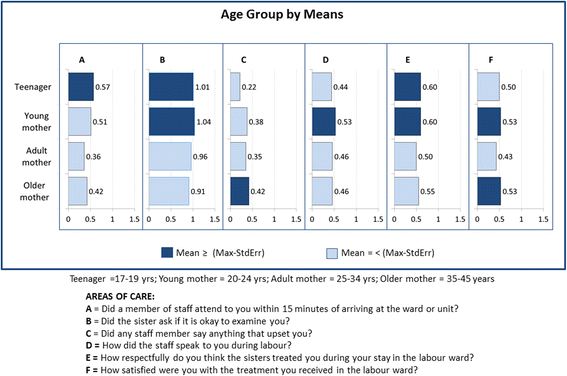It does matter where you come from: mothers' experiences of childbirth in midwife obstetric units, Tshwane, South Africa
- PMID: 29145897
- PMCID: PMC5689145
- DOI: 10.1186/s12978-017-0411-5
It does matter where you come from: mothers' experiences of childbirth in midwife obstetric units, Tshwane, South Africa
Abstract
Background: Health professionals are striving to improve respectful care for women, but they fall short in the domains of effective communication, respectful and dignified care and emotional support during labour. This study aimed to determine women's experiences of childbirth with a view to improving respectful clinical care practices in low-risk, midwife-led obstetric units in the Tshwane District Health District, South Africa.
Methods: A survey covering all midwife-led units in the district was conducted among 653 new mothers. An anonymous questionnaire was administered to mothers returning for a three-days-to-six-weeks postnatal follow-up visit. Mothers were asked about their experiences regarding communication, labour, clinical care and respectful care during confinement. An ANCOVA was performed to identify the socio-demographic variables that significantly predicted disrespectful care. Six items representing the different areas of experience were used in the analysis.
Results: Age, language, educational level and length of residence in the district were significantly associated with disrespectful care (p ≤ 0.01). Overall, the following groups of mothers reported more negative care experiences during labour: women between the ages of 17 and 24 years; women with limited formal education; and women from another province or a neighbouring country. Items which attracted fewer positive responses from participants were the following: 46% of mothers had been welcomed by name on arrival; 47% had been asked to give consent to a physical examination; and 39% had been offered food or water during labour. With regard to items related to respectful care, 54% of mothers indicated that all staff members had spoken courteously to them, 48% said they had been treated with a lot of respect, and 55% were completely satisfied with their treatment.
Conclusion: There is a need to improve respectful care through interventions that are integrated into routine care practices in labour wards. To stop the spiral of abusive obstetric care, the care provided should be culturally sensitive and should address equity for the most vulnerable and underserved groups. All levels of the health care system should employ respectful obstetric care practices, matched with support for midwives and improved clinical governance in maternity facilities.
Keywords: Childbirth; Midwife obstetric units; Predictors of respectful care; Respectful maternity care; South Africa.
Conflict of interest statement
Ethics approval and consent to participate
This study was part of a broader study approved by the Research Ethics Committee of the Faculty of Health Sciences, University of Pretoria (Protocol 541/2015) and the Tshwane District Research Committee. Written permission was obtained from the facility managers of all participating MOUs. Mothers completed the questionnaires voluntarily and anonymously.
Consent for publication
Not applicable
Competing interests
The authors declare that they have no competing interests.
Publisher’s Note
Springer Nature remains neutral with regard to jurisdictional claims in published maps and institutional affiliations.
Figures
Similar articles
-
"Is the doctor God to punish me?!" An intersectional examination of disrespectful and abusive care during childbirth against single mothers in Tunisia.Reprod Health. 2017 Mar 4;14(1):32. doi: 10.1186/s12978-017-0290-9. Reprod Health. 2017. PMID: 28259180 Free PMC article.
-
Women's Views of and Responses to Maternity Services Rendered during Labor and Childbirth in Maternity Units in a Semi-Rural District in South Africa.Int J Environ Res Public Health. 2020 Jul 13;17(14):5035. doi: 10.3390/ijerph17145035. Int J Environ Res Public Health. 2020. PMID: 32668762 Free PMC article.
-
CLEVER maternity care: A before-and-after study of women's experience of childbirth in Tshwane, South Africa.Afr J Prim Health Care Fam Med. 2020 Oct 15;12(1):e1-e8. doi: 10.4102/phcfm.v12i1.2560. Afr J Prim Health Care Fam Med. 2020. PMID: 33181878 Free PMC article.
-
How women's experiences and perceptions of care influence uptake of postnatal care across sub-Saharan Africa: a qualitative systematic review.BMC Pregnancy Childbirth. 2021 Jul 13;21(1):506. doi: 10.1186/s12884-021-03910-6. BMC Pregnancy Childbirth. 2021. PMID: 34256727 Free PMC article.
-
Midwives' perspectives on (dis)respectful intrapartum care during facility-based delivery in sub-Saharan Africa: a qualitative systematic review and meta-synthesis.Reprod Health. 2019 Jul 25;16(1):116. doi: 10.1186/s12978-019-0773-y. Reprod Health. 2019. PMID: 31345239 Free PMC article.
Cited by
-
Health workers' disrespectful and abusive behaviour towards women during labour and delivery: A qualitative study in Durban, South Africa.PLoS One. 2021 Dec 14;16(12):e0261204. doi: 10.1371/journal.pone.0261204. eCollection 2021. PLoS One. 2021. PMID: 34905562 Free PMC article.
-
Exploring networks of care in implementing midwife-led birthing centres in low- and middle-income countries: A scoping review.PLOS Glob Public Health. 2023 May 23;3(5):e0001936. doi: 10.1371/journal.pgph.0001936. eCollection 2023. PLOS Glob Public Health. 2023. PMID: 37220124 Free PMC article.
-
Perception of Women regarding Respectful Maternity Care during Facility-Based Childbirth.Obstet Gynecol Int. 2020 Jul 4;2020:5142398. doi: 10.1155/2020/5142398. eCollection 2020. Obstet Gynecol Int. 2020. PMID: 32695178 Free PMC article.
-
Patient satisfaction with peri-partum care at Bertha Gxowa district hospital, South Africa.Afr J Prim Health Care Fam Med. 2020 Aug 13;12(1):e1-e8. doi: 10.4102/phcfm.v12i1.2409. Afr J Prim Health Care Fam Med. 2020. PMID: 32787408 Free PMC article.
-
Disrespect and Abuse Experienced by Women during Childbirth in Midwife-Led Obstetric Units in Tshwane District, South Africa: A Qualitative Study.Int J Environ Res Public Health. 2020 May 22;17(10):3667. doi: 10.3390/ijerph17103667. Int J Environ Res Public Health. 2020. PMID: 32456063 Free PMC article.
References
-
- Siriwardena AN, Gillam S. Patient perspectives on quality. Qual Prim Care. 2014;22:11–15. - PubMed
MeSH terms
LinkOut - more resources
Full Text Sources
Other Literature Sources
Medical


